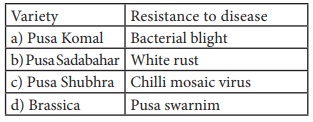Plant Breeding | Botany - Choose the Correct Answers | 12th Botany : Chapter 9 : Plant Breeding
Chapter: 12th Botany : Chapter 9 : Plant Breeding
Choose the Correct Answers
Botany : Plant Breeding
Choose the Correct Answers
Evaluation
1. Assertion: Genetic variation provides the raw material for selection
Reason: Genetic variations are differences in genotypes of the individuals.
a) Assertion is right and reason is wrong.
b) Assertion is wrong and reason is right.
c) Both reason and assertion is right.
d) Both reason and assertion is wrong.
2. While studying the history of domestication of various cultivated plants _______ were recognized earlier
a) Centres of origin
b) Centres of domestication
c) Centres of hybrid
d) Centres of variation
3. Pick out the odd pair.
a) Mass selection – Morphological characters
b) Purline selection - Repeated self pollination
c) Clonal selection - Sexually propagated
d) Natural selection - Involves nature
4. Match Column I with Column II
Column I : Column II
i) William S. Gaud I) Heterosis
ii) Shull II) Mutation breeding
iii) Cotton Mather III) Green revolution
Muller and Stadler IV) Natural hybridization
a) i – I, ii – II, iii – III, iv – IV
b) i – III, ii – I, iii – IV, iv – II
c) i – IV, ii – II, iii – I, iv – IV
d) i – II, ii – IV, iii – III, iv – I
5. The quickest method of plant breeding is
a) Introduction
b) Selection
c) Hybridization
d) Mutation breeding
6. Desired improved variety of economically useful crops are raised by
a) Natural Selection
b) hybridization
c) mutation
d) biofertilisers
7. Plants having similar genotypes produced by plant breeding are called
a) clone
b) haploid
c) autopolyploid
d) genome
8. Importing better varieties and plants from outside and acclimatising them to local environment is called
a) cloning
b) heterosis
c) selection
d) introduction
9. Dwarfing gene of wheat is
a) pal 1
b) Atomita 1
c) Norin 10
d) pelita 2
10. Crosses between the plants of the same variety are called
a) interspecific
b) inter varietal
c) intra varietal
d) inter generic
11. Progeny obtained as a result of repeat self pollination a cross pollinated crop to called
a) pure line
b) pedigree line
c) inbreed line
d) heterosis
12. Jaya and Ratna are the semi dwarf varieties of
a) wheat
b) rice
c) cowpea
d) mustard
13. Which one of the following are the species that are crossed to give sugarcane varieties with high sugar, high yield, thick stems and ability to grow in the sugarcane belt of North India?
a) Saccharum robustum and Saccharum officinarum
b) Saccharum barberi and Saccharum officinarum
c) Saccharum sinense and Saccharum officinarum
d) Saccharum barberi and Saccharum robustum
14. Match column I (crop) with column II (Corresponding disease resistant variety) and select the correct option from the given codes.
Column I Column II
I) Cowpea i) Himgiri
II) Wheat ii) Pusa komal
III) Chilli iii) Pusa Sadabahar
IV) Brassica iv) Pusa Swarnim
a) I:iv, II:iii, III:ii, IV:i
b) I:ii, II:i, III:iii, IV:iv
c) I:ii, II:iv, III:i, IV:iii
d) I:i, II:iii, III:iv, IV:ii
15. A wheat variety, Atlas 66 which has been used as a donor for improving cultivated wheat, which is rich in
a) iron
b) carbohydrates
c) proteins
d) vitamins
16. Which one of the following crop varieties correct matches with its resistance to a disease?

Variety Resistance to disease
a) Pusa Komal - Bacterial blight
b) Pusa Sadabahar - White rust
c) Pusa Shubhra - Chilli mosaic virus
d) Brassica - Pusa swarnim
17. Which of the following is incorrectly paired?
a) Wheat - Himgiri
b) Milch breed - Sahiwal
c) Rice - Ratna
d) Pusa Komal - Brassica
18. Match list I with list II
List I : List II
Biofertilizer Organisms
i) Free living N2 a) Aspergillus
ii) Symbiotic N2 b) Amanita
iii) P Solubilizing c) Anabaena azollae
iv) P Mobilizing d) Azotobactor
a. ic, iia, iiib, ivd
b. id, iic, iiia, ivb.
c. ia, iic, iiib, ivd
c. ib, iia, iiid, ivc.
Related Topics